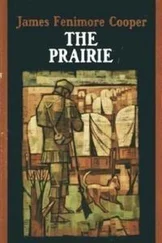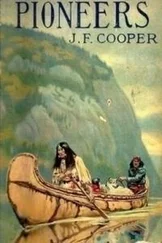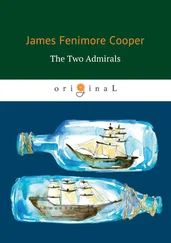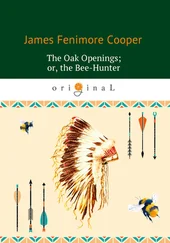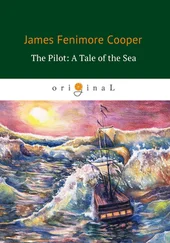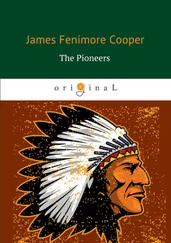Джеймс Купер - The Deerslayer
Здесь есть возможность читать онлайн «Джеймс Купер - The Deerslayer» весь текст электронной книги совершенно бесплатно (целиком полную версию без сокращений). В некоторых случаях можно слушать аудио, скачать через торрент в формате fb2 и присутствует краткое содержание. Год выпуска: 2014, Издательство: epubBooks Classics, Жанр: Исторические приключения, Приключения про индейцев, на английском языке. Описание произведения, (предисловие) а так же отзывы посетителей доступны на портале библиотеки ЛибКат.
- Название:The Deerslayer
- Автор:
- Издательство:epubBooks Classics
- Жанр:
- Год:2014
- ISBN:нет данных
- Рейтинг книги:5 / 5. Голосов: 1
-
Избранное:Добавить в избранное
- Отзывы:
-
Ваша оценка:
- 100
- 1
- 2
- 3
- 4
- 5
The Deerslayer: краткое содержание, описание и аннотация
Предлагаем к чтению аннотацию, описание, краткое содержание или предисловие (зависит от того, что написал сам автор книги «The Deerslayer»). Если вы не нашли необходимую информацию о книге — напишите в комментариях, мы постараемся отыскать её.
The Deerslayer — читать онлайн бесплатно полную книгу (весь текст) целиком
Ниже представлен текст книги, разбитый по страницам. Система сохранения места последней прочитанной страницы, позволяет с удобством читать онлайн бесплатно книгу «The Deerslayer», без необходимости каждый раз заново искать на чём Вы остановились. Поставьте закладку, и сможете в любой момент перейти на страницу, на которой закончили чтение.
Интервал:
Закладка:
"My daughter is handsomer than the wild roses of Ontario; her voice is pleasant to the ear as the song of the wren," answered the cautious and wily chief, who of all the band stood alone in not being fully imposed on by the magnificent and unusual appearance of Judith; but who distrusted even while he wondered: "the humming bird is not much larger than the bee; yet, its feathers are as gay as the tail of the peacock. The Great Spirit sometimes puts very bright clothes on very little animals. Still He covers the Moose with coarse hair. These things are beyond the understanding of poor Indians, who can only comprehend what they see and hear. No doubt my daughter has a very large wigwam somewhere about the lake; the Hurons have not found it, on account of their ignorance?"
"I have told you, chief, that it would be useless to state my rank and residence, in as much as you would not comprehend them. You must trust to your eyes for this knowledge; what red man is there who cannot see? This blanket that I wear is not the blanket of a common squaw; these ornaments are such as the wives and daughters of chiefs only appear in. Now, listen and hear why I have come alone among your people, and hearken to the errand that has brought me here. The Yengeese have young men, as well as the Hurons; and plenty of them, too; this you well know."
"The Yengeese are as plenty as the leaves on the trees! This every Huron knows, and feels."
"I understand you, chief. Had I brought a party with me, it might have caused trouble. My young men and your young men would have looked angrily at each other; especially had my young men seen that pale–face bound for the torture. He is a great hunter, and is much loved by all the garrisons, far and near. There would have been blows about him, and the trail of the Iroquois back to the Canadas would have been marked with blood."
"There is so much blood on it, now," returned the chief, gloomily, "that it blinds our eyes. My young men see that it is all Huron."
"No doubt; and more Huron blood would be spilt had I come surrounded with pale–faces. I have heard of Rivenoak, and have thought it would be better to send him back in peace to his village, that he might leave his women and children behind him; if he then wished to come for our scalps, we would meet him. He loves animals made of ivory, and little rifles. See; I have brought some with me to show him. I am his friend. When he has packed up these things among his goods, he will start for his village, before any of my young men can overtake him, and then he will show his people in Canada what riches they can come to seek, now that our great fathers, across the Salt Lake, have sent each other the war hatchet. I will lead back with me this great hunter, of whom I have need to keep my house in venison."
Judith, who was sufficiently familiar with Indian phraseology, endeavored to express her ideas in the sententious manner common to those people, and she succeeded even beyond her own expectations. Deerslayer did her full justice in the translation, and this so much the more readily, since the girl carefully abstained from uttering any direct untruth; a homage she paid to the young man's known aversion to falsehood, which he deemed a meanness altogether unworthy of a white man's gifts. The offering of the two remaining elephants, and of the pistols already mentioned, one of which was all the worse for the recent accident, produced a lively sensation among the Hurons, generally, though Rivenoak received it coldly, notwithstanding the delight with which he had first discovered the probable existence of a creature with two tails. In a word, this cool and sagacious savage was not so easily imposed on as his followers, and with a sentiment of honor that half the civilized world would have deemed supererogatory, he declined the acceptance of a bribe that he felt no disposition to earn by a compliance with the donor's wishes.
"Let my daughter keep her two–tailed hog, to eat when venison is scarce," he drily answered, "and the little gun, which has two muzzles. The Hurons will kill deer when they are hungry, and they have long rifles to fight with. This hunter cannot quit my young men now; they wish to know if he is as stouthearted as he boasts himself to be."
"That I deny, Huron—" interrupted Deerslayer, with warmth—"Yes, that I downright deny, as ag'in truth and reason. No man has heard me boast, and no man shall, though ye flay me alive, and then roast the quivering flesh, with your own infarnal devices and cruelties! I may be humble, and misfortunate, and your prisoner; but I'm no boaster, by my very gifts."
"My young pale–face boasts he is no boaster," returned the crafty chief: "he must be right. I hear a strange bird singing. It has very rich feathers. No Huron ever before saw such feathers! They will be ashamed to go back to their village, and tell their people that they let their prisoner go on account of the song of this strange bird and not be able to give the name of the bird. They do not know how to say whether it is a wren, or a cat bird. This would be a great disgrace; my young men would not be allowed to travel in the woods without taking their mothers with them, to tell them the names of the birds!"
"You can ask my name of your prisoner," returned the girl. "It is Judith; and there is a great deal of the history of Judith in the pale–face's best book, the Bible. If I am a bird of fine feathers, I have also my name."
"No," answered the wily Huron, betraying the artifice he had so long practised, by speaking in English with tolerable accuracy, "I not ask prisoner. He tired; he want rest. I ask my daughter, with feeble mind. She speak truth. Come here, daughter; you answer. Your name, Hetty?"
"Yes, that's what they call me," returned the girl, "though it's written Esther in the Bible."
"He write him in bible, too! All write in bible. No matter—what her name?"
"That's Judith, and it's so written in the Bible, though father sometimes called her Jude. That's my sister Judith. Thomas Hutter's daughter—Thomas Hutter, whom you called the Muskrat; though he was no muskrat, but a man like yourselves—he lived in a house on the water, and that was enough for you."
A smile of triumph gleamed on the hard wrinkled countenance of the chief, when he found how completely his appeal to the truth–loving Hetty had succeeded. As for Judith, herself, the moment her sister was questioned, she saw that all was lost; for no sign, or even intreaty could have induced the right feeling girl to utter a falsehood. To attempt to impose a daughter of the Muskrat on the savages as a princess, or a great lady, she knew would be idle, and she saw her bold and ingenious expedient for liberating the captive fail, through one of the simplest and most natural causes that could be imagined. She turned her eye on Deerslayer, therefore, as if imploring him to interfere to save them both.
"It will not do, Judith," said the young man, in answer to this appeal, which he understood, though he saw its uselessness; "it will not do. 'Twas a bold idea, and fit for a general's lady, but yonder Mingo" Rivenoak had withdrawn to a little distance, and was out of earshot—"but yonder Mingo is an oncommon man, and not to be deceived by any unnat'ral sarcumvention. Things must come afore him in their right order, to draw a cloud afore his eyes! 'Twas too much to attempt making him fancy that a queen, or a great lady, lived in these mountains, and no doubt he thinks the fine clothes you wear is some of the plunder of your own father—or, at least, of him who once passed for your father; as quite likely it was, if all they say is true."
"At all events, Deerslayer, my presence here will save you for a time. They will hardly attempt torturing you before my face!"
"Why not, Judith? Do you think they will treat a woman of the pale faces more tenderly than they treat their own? It's true that your sex will most likely save you from the torments, but it will not save your liberty, and may not save your scalp. I wish you had not come, my good Judith; it can do no good to me, while it may do great harm to yourself."
Читать дальшеИнтервал:
Закладка:
Похожие книги на «The Deerslayer»
Представляем Вашему вниманию похожие книги на «The Deerslayer» списком для выбора. Мы отобрали схожую по названию и смыслу литературу в надежде предоставить читателям больше вариантов отыскать новые, интересные, ещё непрочитанные произведения.
Обсуждение, отзывы о книге «The Deerslayer» и просто собственные мнения читателей. Оставьте ваши комментарии, напишите, что Вы думаете о произведении, его смысле или главных героях. Укажите что конкретно понравилось, а что нет, и почему Вы так считаете.
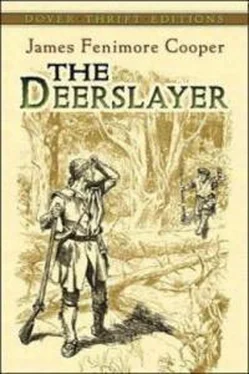

![Джеймс Купер - Пионеры, или У истоков Саскуиханны [The Pioneers, or The sources of the Susquehannah]](/books/395797/dzhejms-kuper-pionery-ili-u-istokov-saskuihanny-t-thumb.webp)
![Джеймс Купер - Последний из могикан, или Повествование о 1757 годе [The Last Of The Mohicans]](/books/397341/dzhejms-kuper-poslednij-iz-mogikan-ili-povestvovan-thumb.webp)
![Джеймс Купер - Зверобой, или Первая тропа войны [The Deerslayer, or The First Warpath]](/books/398571/dzhejms-kuper-zveroboj-ili-pervaya-tropa-vojny-the-thumb.webp)
